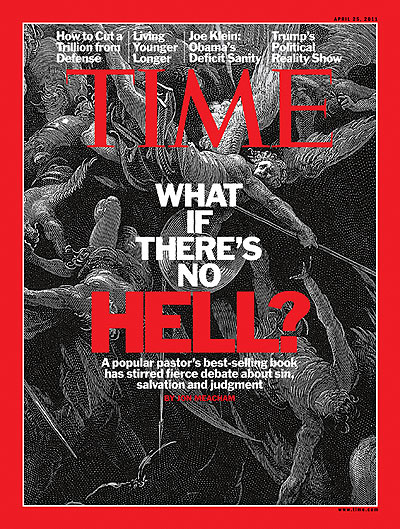 I was recently rereading portions I had marked in a wonderful book written by the Puritan Isaac Watts (1674–1748). He was best known for his hundreds of great hymns, including Nanci's and my all-time favorite Christmas song, "Joy to the World." Watts was not only a hymn-writer, but also a theologian and a pastor.
I was recently rereading portions I had marked in a wonderful book written by the Puritan Isaac Watts (1674–1748). He was best known for his hundreds of great hymns, including Nanci's and my all-time favorite Christmas song, "Joy to the World." Watts was not only a hymn-writer, but also a theologian and a pastor.
The World to Come, which he wrote in 1745, three years before his death, has fallen under our radar. It’s not even listed among his works in the Wikipedia article on Watts. In fact, despite acquiring and reading 150 books on the subject, some centuries old, I didn’t come across this one until after writing my book on Heaven. I read it cover to cover, underlining heavily, and went back to it today because I want to quote portions of it for a future book.
Some of his book is derived from his sermons, some written directly for book form. I had forgotten the portions Watts wrote on the subject of Hell, and was struck by their spot-on relevance to the controversy fueled recently by Rob Bell’s book Love Wins. (See my previous blog posts.) Watts says Hell as a place of eternal punishment has been “in latter and former years made a matter of dispute.” I love that he studied the issue carefully and says that if God had spoken another truth he would gladly embrace it, but that he must “follow the unerring dictates of the Word of God.”
Don’t let the three centuries old vernacular, with its very long sentences, throw you. This is rich and relevant. Simply update the language and this could have been written in direct response to the recent controversy and even the current Time magazine’s article on Rob Bell’s view of Hell.
Here’s Isaac Watts, writing in 1745:
I hope that the whole of these sermons, by the blessing of God, will be made happily useful to Christians, to awaken and warn them, against the danger of being seized by death in a state unprepared for the presence of God, and the happiness of heaven, and to raise the comforts and joys of many pious souls in the lively expectation of future blessedness.
The last discourses of this book, especially the “eternity of the punishments of hell,” have been in latter and former years made a matter of dispute; and were I to pursue my enquiries into this doctrine, only by the aids of the light of nature and reason, I fear my natural tenderness might warp me aside from the rules and the demands of strict justice, and the wise and holy government of the great God.
But as I confine myself almost entirely to the revelation of Scripture in all my searches into the things of revealed religion and Christianity, I am constrained to forget or to lay aside that softness and tenderness of animal nature which might lead me astray, and to follow the unerring dictates of the word of God.
The Scripture frequently, and in the plainest and strongest manner, asserts the everlasting punishment of sinners in hell; and that by all the methods of expression which are used in Scripture to signify, an everlasting continuance.
God’s utter hatred and aversion to sin, in this perpetual punishment of it, are manifested many ways:
(1.) By the just and severe threatening: of the wise and righteous Governor of the world, which are scattered up and down in his Word.(2.) By the veracity of God in his intimations or narratives of past events, as Jude v. 7. “Sodom and Gomorrah suffering the vengeance of eternal fire.”
(3.) By his express predictions (Matthew 25:46). “These shall go away into everlasting punishment” (2 Thessalonians 1:9). “Who shall be punished with everlasting destruction;” and I might add,
(4.) by the veracity and truth of all his holy Prophets and Apostles, and his Son Jesus Christ at the head of them, whom he has sent to acquaint mankind with the rules of their duty, and the certain judgment of God in a holy correspondence therewith, and that in such words as seem to admit of no way of escape, or of hope for the condemned criminals.
I must confess here, if it were possible for the great and blessed God any other way to vindicate his own eternal and unchangeable hatred of sin, the inflexible justice of his government, the wisdom of his severe threatenings, and the veracity of his predictions, if it were also possible for him, without this terrible execution, to vindicate the veracity, sincerity, and wisdom of the Prophets and Apostles, and Jesus Christ his Son, the greatest and chiefest of his divine messengers; and then, if the blessed God should at any time, in a consistence with his glorious and incomprehensible perfections, release those wretched creatures from their acute pains and long imprisonment in hell, either with a design of the utter destruction of their’ beings by annihilation, or to put them into some unknown world, upon a new foot of trial, I think I ought cheerfully and joyfully to accept this appointment of God, for the good of millions of my fellow-creatures, and add my joys and praises to all the song: and triumphs of the heavenly world in the day, of such a divine and glorious release of these prisoners.
But I feel myself under a necessity of confessing, that I am utterly unable to solve these difficulties according to the discoveries of the New Testament, which must be my constant rule of faith, and hope, and expectation, with regard to myself and others. I have read the strongest and best writers on the other side, yet after all my studies I have not been able to find any way how these difficulties may be removed, and how the divine perfections, and the conduct of God in his Word, may be fairly vindicated without the establishment of this doctrine, as awful and formidable as it is.
The World to Come, Isaac Watts (Morgan, PA: Soli Deo Gloria Publications, 1954), pages 10-11.



